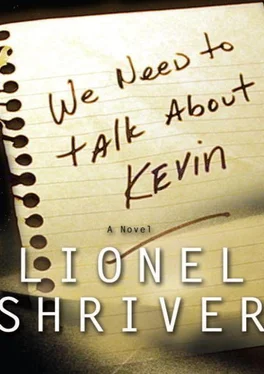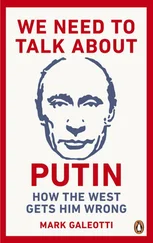He may have liked that. Maybe I passed on my own inclination to rise to a challenge, the very impulse that got me pregnant with the boy in the first place. And though he may have enjoyed sticking his mother, who fancied herself so “special,” with the insult of cliché—like it or not, little Ms. International Traveler would become one more assembly-line mother of a tacky American type, and he knew how much it pained me that my sassy VW Luna was now every fifth car in the Northeast—he still liked the idea of setting himself apart. Since after Columbine he grumbled in Claverack that “any idiot can fire a shotgun,” he must have recognized that being “the crossbow kid” would mark his little prank in the popular imagination. Indeed, by the spring of 1999 the field was crowded, and the once indelibly impressed names of Luke Woodham and Michael Carneal were already beginning to fade.
Moreover, he was certainly showing off. Maybe Jeff Reeves played a mean guitar riff, Soweto Washington could swish his free-throws, and Laura Woolford could get the whole football team to ogle her slim behind as it twitched down the hall, but Kevin Khatchadourian could put an arrow through an apple—or an ear—from fifty meters.
Nevertheless, I’m convinced that his leading motivation was ideological. Not that “I got plot” nonsense he fobbed off on Jack Marlin. Rather, I have in mind the “purity” he admired in the computer virus. Having registered the social compulsion to derive some broad, trenchant lesson from every asinine murder spree, he must have painstakingly parsed the prospective fallout from his own.
His father, at least, was forever dragging him off to some cluttered Native American museum or dreary Revolutionary War battlefield, so that anyone who tried to portray him as the neglected victim of the self-centered two-career marriage would have an uphill battle, and whatever he may have intuited, we were not divorced: no copy there. He wasn’t a member of a satanic cult; most of his friends didn’t go to church either, so godlessness was unlikely to emerge as a cautionary theme. He wasn’t picked on—he had his unsavory friends, and his contemporaries went out of their way to leave him be—so the poor-persecuted-misfit, we-must-do-something-to-stopbullying-in-schools number wouldn’t go very far. Unlike the mental incontinents he held in such contempt, who passed malignant notes in class and made extravagant promises to confidants, he’d kept his mouth shut; he hadn’t posted a homicidal web site or written essays about blowing up the school, and the most creative social commentator would be hard-pressed to deploy a satire about sports utility vehicles as one of those unmissable “warning signs” that are now meant to drive vigilant parents and teachers to call confidential hotlines. But best of all, if he accomplished his stunt entirely with a mere crossbow, his mother and all her mush-headed liberal friends wouldn’t be able to parade him before Congress as one more poster boy for gun control. In short, his choice of weapon was meant to ensure to the best of his ability that Thursday would mean absolutely nothing.
When I got up at the usual 6:30 A.M. on April 8, 1999, I wasn’t yet impelled to put that day of the week in italics. I picked out a blouse I rarely wore; you bent to me as I buttoned it in the mirror and said that I might not like to admit it, but I looked good in pink, and you kissed my temple. In those days your smallest kindness was writ large, and I blushed with pleasure. Once again I hoped you might be having second thoughts about separation, although I was reluctant to ask you outright and so risk spoiling the illusion. I made coffee, then roused Celia, helping her to clean and replace her prosthesis. She was still having trouble with discharge, and wiping the yellow crust off the glass and out of her eyelashes and tear duct could take a good ten minutes. Though it is amazing what you get used to, I still felt relieved once the glass eye was in, her watery blue gaze restored.
Aside from the fact that Kevin got up without having to be rousted three times, it began as a normal morning. As ever, I marveled at your appetite, recently revived; you may have been the last WASP in America who still regularly breakfasted on two eggs, bacon, sausage, and toast. I could never manage more than coffee, but I loved the sizzle of smoked pork, the fragrance of browning bread, and the general atmosphere of relish for the day ahead that this ritual fostered. The sheer vigor with which you prepared this feast must have scrubbed your arteries of its consequences.
“Look at you!” I exclaimed when Kevin emerged. I was carefully frying Celia’s French toast completely dry, lest a little undercooked egg seem like slime. “What happened, were all your size-one clothes in the wash?”
“Some days you just wake up,” he said, tucking his billowing white fencing shirt into the same rippling black rayon slacks he had worn to Hudson House, “with a sense of occasion.”
In plain view, he packed the five Kryptonite locks and chains into his backpack. I assumed he’d found takers at school.
“Kevin looks really handsome,” said Celia shyly.
“Yup, your brother’s a heartbreaker,” I said. And wouldn’t he be.
I sifted a generous dusting of confectioner’s sugar over the toast, stooping by Celia’s soft blond hair to mumble, “Now don’t dawdle, you don’t want to be late for school again. You’re supposed to eat it, not make friends with it.”
I tucked her hair behind her ears and kissed the top of her head, and as I did so Kevin cut a glance toward me as he loaded the backpack with another chain. Though he’d entered the kitchen with a rare energy, now his eyes had gone dead.
“Hey, Kev!” you cried. “I ever show you how this camera works? Good knowledge of photography never hurt anybody; it’s sure paid off for me. Get over here, there’s time. I don’t know what’s got into you, but you have forty-five minutes to spare.” You pushed your greasy plate out of the way and opened the camera bag at your feet.
Unwillingly, Kevin floated over. He didn’t seem in the mood for Gee-Dadding this morning. As you went through the lighting and f-stop positions, I felt a pang of recognition. Your own father’s awkward version of intimacy was always to explain in far greater detail than anyone cared to hear exactly how some device worked. You didn’t share Herbert’s conviction that to take apart the clockwork of the universe was to unlock the extent of its mysteries, but you had inherited a resort to mechanics as an emotional crutch.
“This reminds me,” you said mid-instruction. “I want to shoot a roll of you at archery practice sometime soon. Capture that steely gaze and steady arm for posterity, how about it? We could do a whole photomontage for the foyer: Braveheart of the Palisades!”
Slapping his shoulder was probably a mistake; he flinched. And for the briefest of moments I appreciated what little access we ever had to what really went on in Kevin’s head, since for a second the mask fell, and his face curdled with—well, with revulsion, I’m afraid. To allow even so brief a glimpse of its workings, he must have had other things on his mind.
“Yeah. Dad ,” he said effortfully. “That would be… great .”
Yet I chose this of all mornings to gaze upon our domestic tableau in soft focus. All teenagers hate their parents, I thought, and there was something priceless about the antipathy if you could take it. As the sun caught the fine gold of Celia’s hair while she cut her French toast into ridiculously tiny pieces and you embarked on a riff about the dangers of backlighting while Kevin twitched with impatience, I was so heartened by this Norman Rockwell moment that I considered sticking around until the kids had to leave for school, maybe giving Celia a lift myself instead of leaving the run to you. Would that I had given in to the temptation! But children need routine, I decided, and if I didn’t get a jump on the morning rush hour, there would be hell to pay on the bridge.
Читать дальше












